
Photo by Jennifer Robison
Mahaffey Farms in Bossier Parish, La., is at the heart of a growing local foods movement. From left to right are the McCommon family — Nicky, Evan and Taylor — and Evan’s mother, Sandra Evans, who produce vegetables, pastured meats and eggs.
When life gives you lemons, make organic, locally sourced lemonade
That kind of thinking is bringing new life to a 90-year-old farm in northwest Louisiana.
By combining traditional agricultural practices with modern marketing, including farm-to-table dinners, a farm store and a bed-and-breakfast, Mahaffey Farms owner Evan McCommon and his family are introducing a new generation to fresh seasonal foods in northwest Louisiana.
“We’re taking the family farm to the next level,” Evan says.
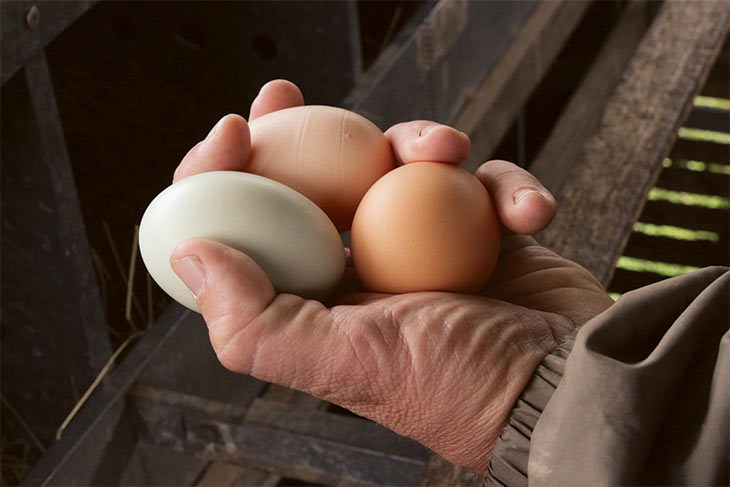
Photo by Christine Forrest
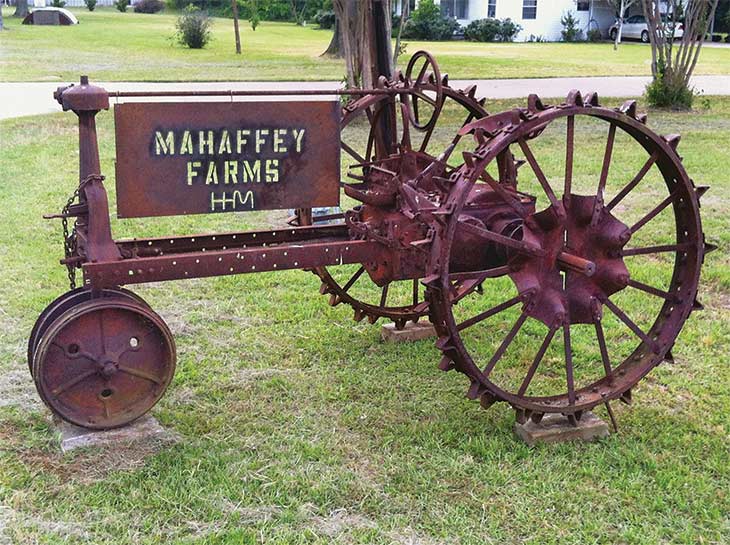
Photo by Mahaffey Farms
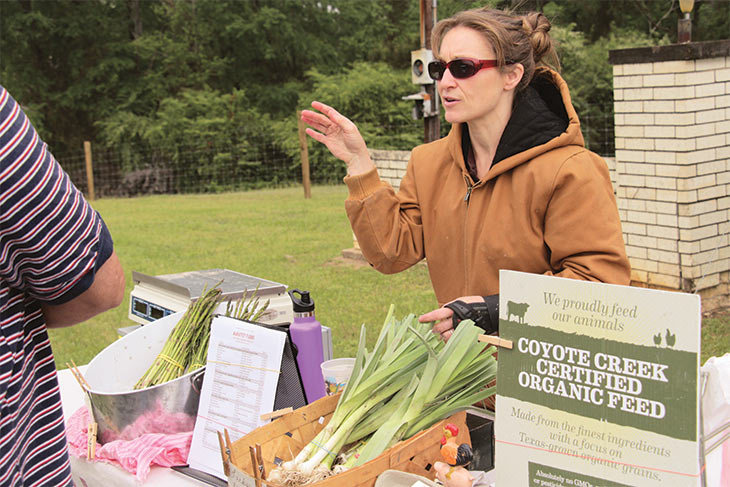
Photo by Christine Forrest
Old Methods for New Reasons
The farm, located minutes from where the Red River runs through Shreveport and Bossier City, has come full circle since the 1920s, when it was started by Evan’s great-uncle, H.H. “Happy” Mahaffey. Once home to orchards, gardens, cattle and a large hay operation, it later reverted to pine and hardwood forest when it was too much for his widow to manage.
To keep the farm intact and in the family, a great-aunt put the land in trust and enlisted Evan to run it in 1995, before he’d turned 20.
Forestry and conservation were the most practical uses for the land until the economy stumbled around 2008, taking timber with it.
Evan, a real estate agent at the time, knew the farm needed to diversify to be sustainable. Its new direction came from the family’s pursuit of a healthy diet and lifestyle, thanks in part to Evan’s wife, Nicky, a physician who specializes in rural medicine.
They wanted to buy fresh and organic food from local farmers, but in those days, that was hard to find.
“We’ve always enjoyed agriculture,” Evan says. “We saw an opportunity, and we had the land base.”
By 2012 the gardens were back at Mahaffey Farms, which soon earned a following at farmers markets for purple hull peas, heirloom tomatoes, squash, greens, onions and other Southern staples. Next the family introduced pasture-raised livestock — an even better fit for the sandy soil and rolling terrain.
Today the property looks a lot like North Louisiana farms did a century ago, when heritage breeds of pigs, cattle and poultry did their share of the work controlling brush and fertilizing the soil.
The regenerative cycle is renewing the farm, and is also good for the community and economy. The McCommons capture that mission in their slogan, “Cultivate the 318,” referring to the North Louisiana area code.
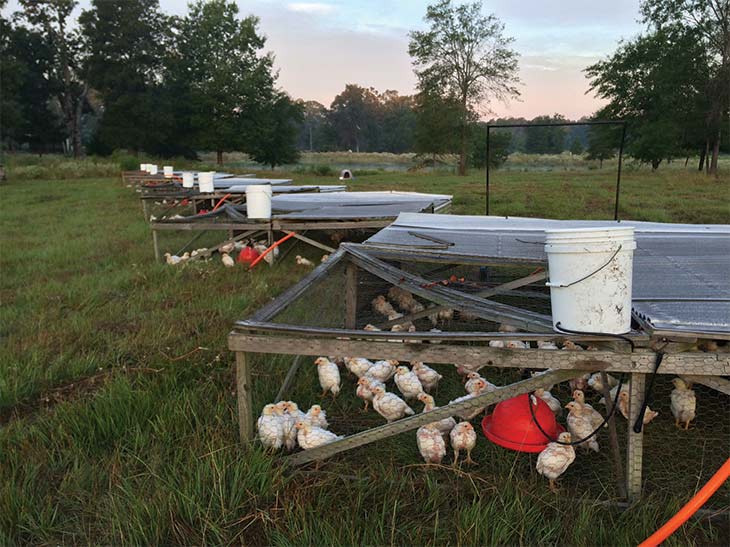
Photo by Taylor McCommon
Mobile pens for the broilers
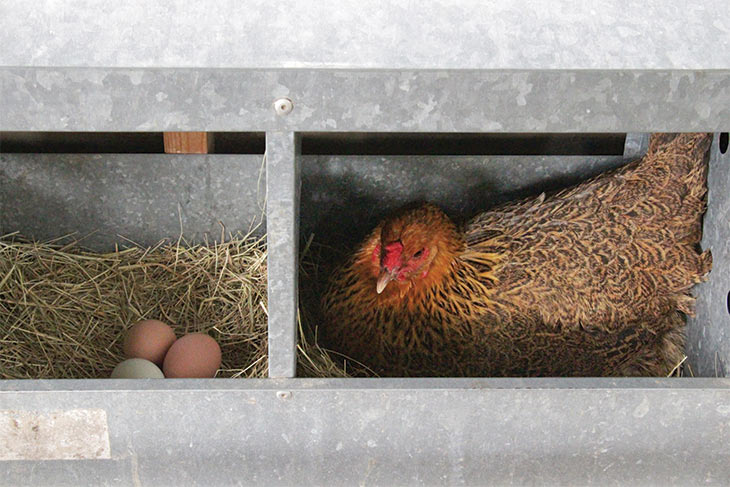
Photo by Christine Forrest
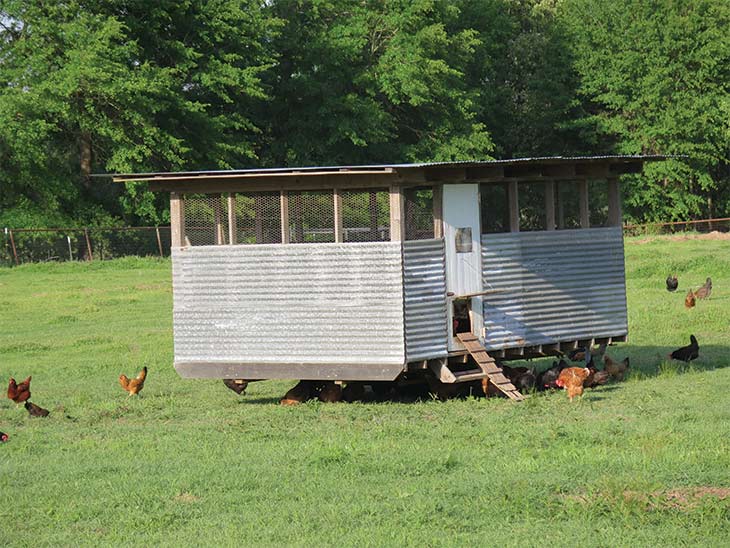
Photo by Christine Forrest
The Eggmobile
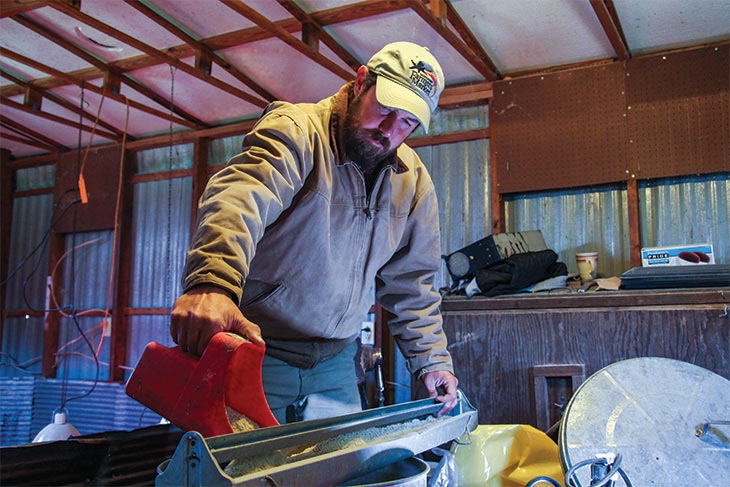
Photo by Christine Forrest
Feeding time
Build the Soil, Feed the Soul
This year, red wattle hogs are leveling last year’s garden and re-establishing healthy pasture along the edge of the woods by fertilizing and turning the soil. The heritage breed had a close call with extinction before it was found living wild in East Texas.
“Red wattles rank high for flavor,” Evan says. “They call pork the other white meat, but none of our meat’s white. Our pigs are physically active. They run. They sprint. That affects meat texture in a huge way.”
The lean, rose-colored pork is one reason the McCommons’ son, Taylor, looks forward to weekends at home.
“Our pork chops are like steaks,” says Taylor, a junior in environmental science and forestry at Louisiana Tech University.
His mornings at home start early with moving the pastured poultry.
Eight mobile pens house Cornish-cross broilers, and several breeds of egg layers live in the high-rise comfort of a wheeled eggmobile. The shelters are moved daily to let the ground recover and give the chickens access to fresh grass and insects.
Grass-fed cattle round out the operation.
Evan manages trees, livestock and pasture in an integrated system called silvopasture. The practice provides shaded pasture for their Pineywoods cattle, a hardy heritage breed that descended from Spanish stock centuries ago and adapted to life in the wild.
“Our customers are really interested in grass-fed beef,” Evan says. “Our beef is lean, but it’s tender. We dry-age at least 14 days.”
The McCommons harvest about 200 hogs, a dozen head of cattle and up to 5,000 broilers a year, selling meat, bacon, sausage and other products at farmers markets, in the farm store and through home delivery. Their products are also in restaurants from Shreveport to Monroe.
They strive to produce food without chemicals, and will consider getting organic certification if they ever sell in grocery stores. For now, they’re building their brand, and using social media and a blog to connect with consumers.
Slow Food and Health Food
Foods with strong regional and cultural connections make you want to take your time and savor them — the hallmark of the slow-food movement.
For Evan, who used to design commercial cooking equipment for fast-food chains, slow is the way to go.
“They want to know that the animals are happy. That’s a big deal. Our farm is open to tours. You can ask us anything.”
–Evan McCommon
“Why wouldn’t you want seasonal, regional flavor?” he asks. “In Europe, every region has its own cheese, breed of cattle, breads. That’s a beautiful culture.”
At least once a year, the family hosts more than 100 people at a farm-to-table dinner benefiting the North Louisiana Chapter of the grassroots organization Slow Food USA.
Visitors also come to the farm for tours and the store, which is staffed by a full-time sales manager. Evan’s mother runs a bed-and-breakfast, continuing a long tradition of hospitality.
“People didn’t eat out back when my aunts lived here; they cooked and hosted guests,” says his mom, Sandra Evans, who grew up next door. Breakfast at the B&B is fresh from the farm.
The food is both delicious and nutritious. The McCommons cite studies from the Louisiana State University Ag Center and other institutions that have found benefits to pastured meats and eggs, including a balanced ratio of omega-6 to omega-3 fatty acids, ample vitamin D and other nutrients.
While pastured meats are also leaner, fat isn’t necessarily unhealthy, they say. Nicky has seen patients lose weight and even manage diabetes without insulin by switching from a high-carb, high-sugar diet to a ketogenic diet high in protein and fat.
Still, they try to give people more options, not tell them how to eat.
To make buying from Mahaffey Farms easier, last year they added product lines with different price points. Red, green and blue labels distinguish meats by the cost of feed, including organic, non-GMO or conventional feed, such as spent grain from a local brewery.
“Some customers want organic, but not if it costs more,” Nicky says. “Some want local, some want non-GMO, some avoid nitrates.”
There’s one thing people agree on.
“They want to know that the animals are happy. That’s a big deal,” Evan says. “Our farm is open to tours. You can ask us anything.”
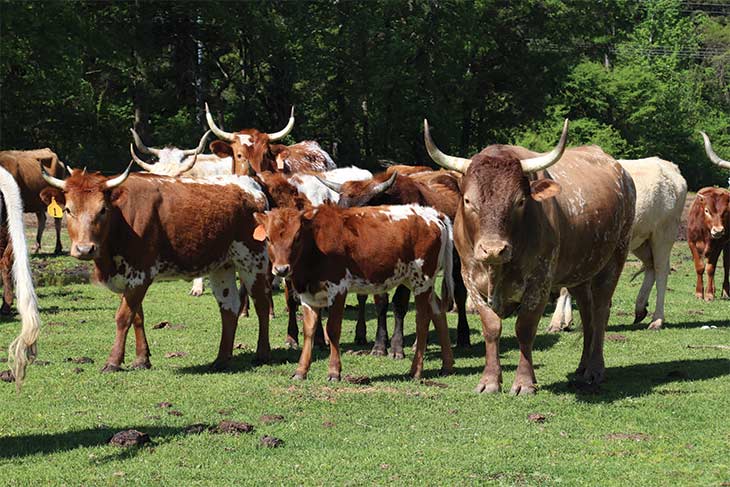
Photo by Christine Forrest
Pineywoods cattle
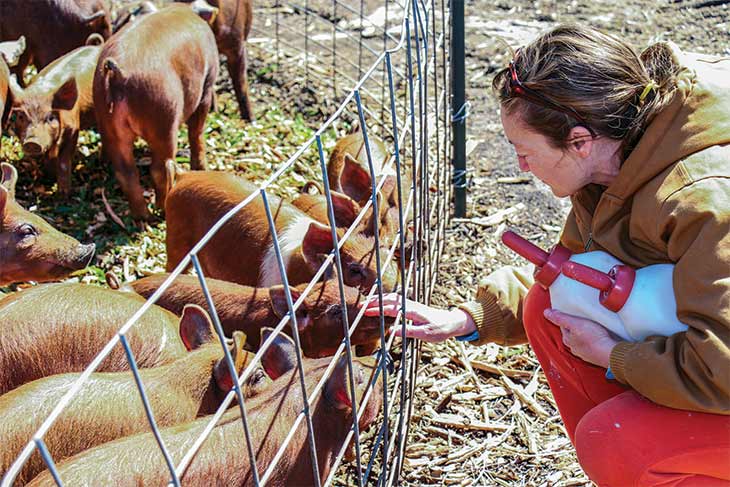
Photo by Christine Forrest
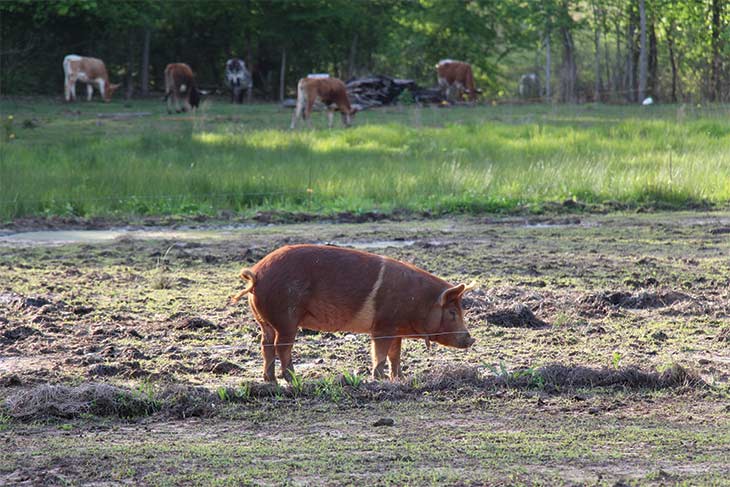
Photo by Christine Forrest
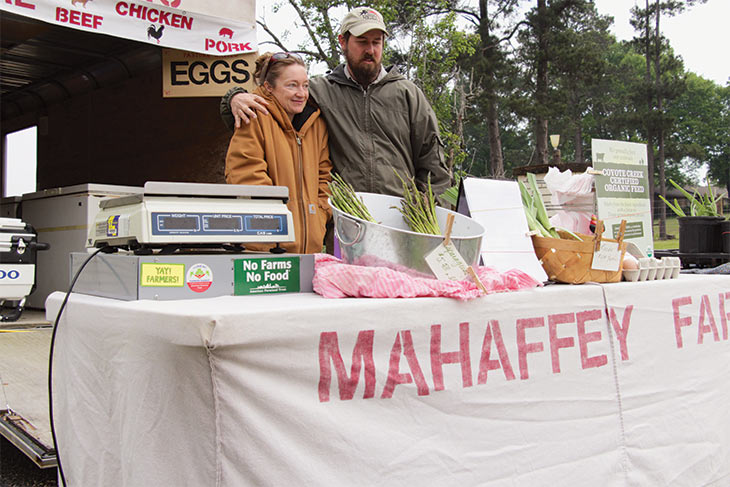
Photo by Christine Forrest
While transitioning from their current farm store to the former golf clubhouse, Nicky and Evan McCommon have been selling their pastured meats, eggs and vegetables at an outdoor farm stand.
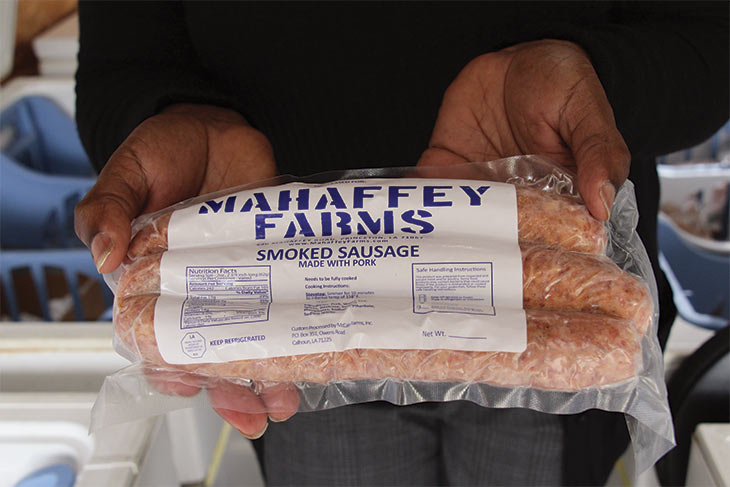
Photo by Christine Forrest
Hitting a Hole in One
Reinvigorating hundreds of wooded acres has been hard work for the McCommons — and they aren’t finished yet. When a 62-acre golf course next door came on the market, Evan and Nicky saw potential in the buildings, irrigated fairways, ponds and highway frontage. They purchased the property last summer with financing from Louisiana Land Bank.
“It’s beautiful, open land with large trees and a blacktop road to the clubhouse,” says their loan officer, Jon Fielder, Louisiana Land Bank vice president and Shreveport branch manager. “Long-term financing for a purchase like this helps owners preserve their cash flow.”
Now pastured poultry live on the former fairways, and will rotate with cattle in the future.
“The farm addition is a dream,” Evan says.
With the help of a permaculture consultant, the McCommons are using satellite images, lidar and custom maps to plan roads, fences, water flow, pastures and timber stands.
They want an operation that’s big enough to have sustainable farm income, yet small enough to preserve their lifestyle.
“We understand the scale of the industry and why conventional farmers do the things they do,” Evan says. “That’s what’s feeding America by a long shot. We’re just providing a niche and making a lifestyle choice.”
Lately their lifestyle has involved a lot of sweat equity. Eastwood Fairways’ pool house is now a chicken-processing facility, the swimming pool is being converted into a below-grade greenhouse, and the clubhouse will be the new farm store — complete with a commercial kitchen and event space for classes and dinners.
The product selection will grow, too.
“Our customers usually spend $20 to $100 because we’re selling meat,” Evan says. “If they’re making a trip out to the farm, they want a variety of groceries. We’re looking to do a cooperative-style model where we’ll carry Louisiana products from other farmers.”
When all’s said and done, the McCommons will have a more efficient ag operation, and customers will have a convenient place to buy local meats, eggs, vegetables, figs, berries, nursery plants and trees.
Just no lemons.
–Staff
Learn more at MahaffeyFarms.com.